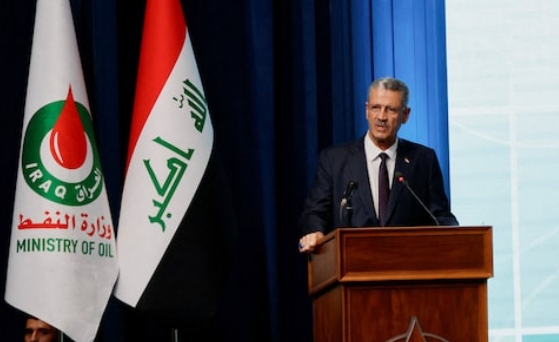
Iraq's Oil Minister Hayan Abdel-Ghani attends the fifth plus and sixth licensing rounds for 29 oil and gas exploration blocks at the Oil Ministry's headquarters in Baghdad, Iraq, May 11, 2024.
Oil exports from the semi-autonomous Kurdistan region will resume next week, Iraq's oil minister said on Monday, resolving a near two-year dispute as ties between Baghdad and Erbil improve, potentially adding more supply to the oil market and weighing on prices.
The oil flows were halted by Turkey in March 2023 after the International Chamber of Commerce ordered Ankara to pay Baghdad damages of $1.5 billion for unauthorised pipeline exports by the Kurdistan Regional Government between 2014 and 2018.
"Tomorrow, a delegation from the Ministry of Oil ... will visit the Kurdish region to negotiate the mechanism for receiving oil from the region and exporting it. The export process will resume within a week," Oil Minister Hayan Abdel-Ghani told reporters.
He added that Baghdad would receive 300,000 barrels per day (bpd) from the region.
Further supply could result from a potential Russia-Ukraine peace deal while OPEC+ is also due to start easing cuts to production, opens new tab from April.
Oil prices slipped on Monday, with Brent crude trading below $75 a barrel by 1235 GMT.
Iraq, OPEC's second-largest producer behind Saudi Arabia, is currently pumping about 4 million bpd, OPEC data shows, in line with the production target agreed with the wider OPEC+ alliance.
It remains unclear how Iraq will boost its northern exports and stay compliant with OPEC+ cuts and whether it would, for example, trim exports from Basrah in southern Iraq.
Erbil-based Rudaw TV earlier cited Kurdistan's natural resources minister, Kamal Mohammed, as saying oil exports could resume before March because all legal procedures have been completed.
The Iraqi parliament approved a budget amendment this month to subsidise production costs for international oil companies operating in Kurdistan, aiming to unblock northern oil exports.
The resumption is expected to ease economic pressure in the Kurdistan region, where the halt has led to salary delays for public sector workers and cuts to essential services.